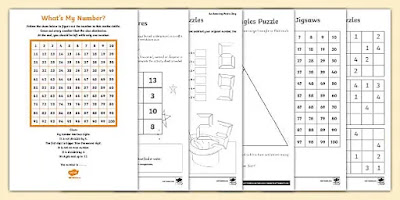How do you teach numeracy to children
with special needs?
Maybe you home educate, or you are home schooling due to Covid, or perhaps you are looking for some fun activities to supplement the work your child is doing in class.
I try to build maths into our everyday lives, to make it fun and relevant for life. Natty is a kinesthetic learner, so I am always looking for innovative ways, such as music, song and movement to increase her confidence with numbers. But it's easy to get stuck in a rut when you plan numeracy activities with your child. I know I certainly do.
So I asked you, our lovely Downs Side Up readers for your suggestions for this crowd-sourced post. And what a resourceful and imaginative lot you are!
Check out the top tried and tested maths suggestions below.
Educational Toys
 |
| A teaching clock is a great investment |
The shapes also thread on to a sturdy string, a bonus fine motor skills activity too!
Natty loves this teaching clock for telling the time practice, as the hand are easy to move and I love the retro, sustainable packaging it arrived in.
Specialist Numeracy Kits
Numicon is a fantastic approach to teaching numbers, developed by Oxford University Press. We have a Numicon Home Kit, that includes the everything you need to get started on learning maths and the relationship between numbers in a multi-sensory way. This scheme is also incorporated into a lot of other Apps and games listed below.
Number Stacks - work in a similar way and provide tactile variety for young learners.
Maths Apps
There are so many Apps out there, but you need to find something your child likes that preferably doesn't have in App purchases or adverts. Here is just a sample:
Special iApps - developed by the parents of a young man who has Down's syndrome. You can create personalised tasks and they also have Numicon resources available.
Endless Numbers - Adorable monsters teach number recognition and sequences.
Twinkl Interactive 100 Square - fill in the blanks on a colourful number grid 1-100.
Squeebles Numbers Bonds and Times Tables are popular in this house too.
Or you could find a colourful Dot to Dot game your child likes.
Maths for Life
Maths for Life was developed by a The Maths Mum, teacher and parent of a youngster with Down's syndrome. This maths system is taking the DS world by storm and is highly rated by kids, parents and teachers alike. Focussing on practical maths which incorporates Numicon, you can download assessment worksheets and then pay for activities tailored to your child's level.
Books
There are lots of wonderful books to choose from when it comes to number work.
There are old favourites such as The Hungry Caterpillar Finger Puppet book or The Crayons Book of Numbers.
And we like the Makaton Number Book as it uses sign to back up language learned.
You could try the Usborne Lift the Flap Numbers book or a colouring and sticker book.
Natty also has the Kumon series. There are book that focus on number formation, simple addition or mazes. It's reassuringly repetitive and moves on in tiny steps.
Songs
Youngsters learn so much by repeating songs. So get singing Ten in the Bed, 1,2,3,4,5 or 5 Little Ducks (cuteness overload in the video below!) whenever you can. We love anything by the singing, Makaton signing sensations that are the Singing Hands ladies of course.
Flash Cards
You can make your own, print and laminate or buy number flashcards inexpensively.
TV Programmes
The CBBC and CBeebies has a great deal to offer, as well as a website full of games to go with their programmes. Number Blocks is particularly popular with your youngsters.
Games that Involve Maths
Games are a great way to bring the family together, and not just for Christmas.
From turn-taking, to strategic thinking, numbers bonds and counting, board games are an invaluable way to support your child's maths journey and get them off their tablet! We love:
Solitaire - a nostalgic classic that is ideal for older children and adults alike.
Rummicub
Shape Activities
Jigsaws are an amazing way to work on shapes and sorting. Natty, being a visual learner, is particularly good at these. Let your child choose a picture and jisgaw that they find appealing and that is appropriate in size and number of pieces for their ability.
Natty has a magnetic shapes kit that she uses to create pictures which she really loves. Shape sorters are a great way to introduce shape too.
Free Online Resources
No maths post would be complete without a shout out to Twinkl Resources.
You can download everything from posters, to flash cards, to visual timetables, worksheets and games here.
You can search resources by topic or ability as well.
And last, but very much not least, Georgina at The SEN Resources Blog has a whole Numeracy category and her book 100 Ways Your Child Can Learn Through Play, includes lots of fun activities for you and your child to enjoy together, many of them outdoors.
There's plenty there to get you started. We'd love to hear of any other maths resources that you enjoy using, and wish you well on your number quests.
Happy counting everyone!
*I was sent a teaching clock for review, and compensated for my time to write this post.












No comments:
Post a Comment
Thank you for joining in the conversation at Downs Side Up